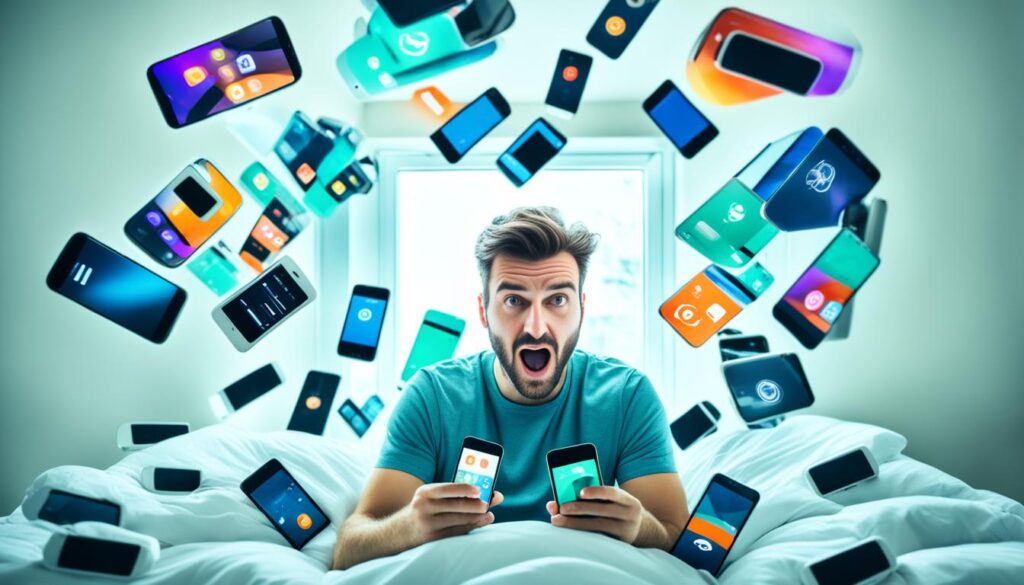Are Smartphones Addictive? Uncover the Truth.
Smartphones have become an indispensable part of our daily lives, keeping us connected, informed, and entertained. But could our relationship with these devices be more than just a convenience? Is there a hidden downside to our smartphone usage that we may not be fully aware of?
In this article, we dig deep into the world of smartphones and explore the truth behind their addictive nature. We’ll examine the potential impacts of excessive smartphone usage and delve into the psychological and societal factors that contribute to mobile device dependency. So, buckle up and prepare to uncover the truth about smartphone addiction.
Key Takeaways:
- Smartphones have become an integral part of our daily lives, but are they addictive?
- Excessive smartphone usage can have detrimental effects on our mental health.
- Psychological and sociocultural factors play a significant role in smartphone addiction.
- Smartphones have been designed to capture and keep our attention.
- Combatting problematic smartphone use requires setting healthy boundaries and seeking professional help if needed.
Understanding Smartphone Usage and Potential Addiction
Smartphones have become an integral part of modern life, revolutionizing the way we communicate, access information, and entertain ourselves. However, with the increasing reliance on technology, it is crucial to understand the potential for smartphone addiction and its impact on individuals. This section delves deeper into the understanding of smartphone usage and its potential for addiction.
The Neuroscience of Smartphone Use
Research has shown that smartphone use stimulates the brain’s pleasure centers, releasing dopamine, a neurotransmitter associated with rewards and pleasure. This can create a positive reinforcement loop, making smartphone usage addictive for some individuals. Understanding the neuroscience behind smartphone use can help shed light on the mechanisms that contribute to potential addiction.
Comparing Behavioral Addictions With Substance Dependencies
Behavioral addictions, such as smartphone addiction, share similarities with substance dependencies. Both types of addiction can lead to negative consequences, affect mental health, and interfere with daily life. However, it is important to recognize the unique aspects of behavioral addictions and the specific challenges they pose for individuals seeking help and recovery.
Are Smartphones Designed to be Addictive?
There is ongoing debate about whether smartphones are intentionally designed to be addictive. Some argue that app creators and technology companies employ persuasive design techniques to keep users hooked and engaged. These techniques include notifications, rewards, and social validation elements. Understanding the intentions behind smartphone design can help us make informed decisions about our device usage and develop strategies to maintain a healthy relationship with technology.
By exploring the neuroscience behind smartphone use, comparing behavioral addictions with substance dependencies, and questioning the design principles of smartphones, we can gain a deeper understanding of the potential for addiction in smartphone usage. This knowledge is essential in navigating the digital landscape and developing strategies to use smartphones responsibly and mindfully.
Psychological Perspectives on Smartphone Overuse

This section examines the psychological perspectives on smartphone overuse. It delves into the impact of smartphone use on mental health, the influence of sociocultural context on smartphone addiction, and how digital behaviors reflect societal norms and values.
The Impact of Smartphone Use on Mental Health
Smartphone usage has become increasingly prevalent in today’s society, with individuals spending significant amounts of time engaged with their screens. However, this excessive screen time has raised concerns about its impact on mental health. Studies have shown a relationship between smartphone overuse and various mental health issues, including anxiety, depression, and sleep disturbances. The constant connection to digital devices can contribute to feelings of loneliness, social isolation, and decreased well-being. Furthermore, excessive smartphone use has been linked to addictive behaviors and even the development of smartphone use disorder, a condition characterized by compulsive smartphone use and withdrawal symptoms when attempting to reduce usage.
Sociocultural Context and Its Influence on Smartphone Addiction
The influence of sociocultural context plays a significant role in the development and perpetuation of smartphone addiction. Cultural norms, societal expectations, and peer pressure can influence an individual’s smartphone usage patterns and contribute to addictive behaviors. For example, in cultures where smartphones are highly valued and seen as symbols of status or success, individuals may feel a stronger compulsion to constantly engage with their devices. Additionally, the integration of smartphones into various aspects of daily life, such as work, education, and social interactions, makes it challenging to disengage from their use. Understanding the sociocultural context is crucial for addressing smartphone addiction comprehensively.
Norms and Values Reflected in Digital Behaviors
Digital behaviors, including smartphone use, are not only influenced by sociocultural context but also reflect societal norms and values. The way individuals interact with their smartphones and engage with online platforms can provide insights into broader societal trends and behaviors. For example, the over-reliance on smartphones for social validation, the constant need for instant gratification through digital notifications, and the prioritization of online connections over face-to-face interactions reflect societal values of hyperconnectivity, instant gratification, and external validation. Recognizing and analyzing these digital behaviors can provide valuable insights into the impact of technology on society and inform interventions for healthier smartphone use.
Are Smartphones Addictive?
One of the most debated topics in the digital age is the addictive nature of smartphones. While smartphones have certainly revolutionized our lives and made communication more convenient, concerns about phone addiction and smartphone dependence have been on the rise. In this section, we will explore different viewpoints and arguments surrounding the addictive nature of smartphones, as well as discuss the potential signs and symptoms of smartphone addiction.
Proponents argue that smartphones can be addictive due to the constant connectivity and access to information they provide. The instant gratification of receiving notifications, social media interactions, and the never-ending stream of content can create a sense of dependency. Moreover, the reward mechanisms in our brain, such as the release of dopamine, can contribute to the addictive nature of smartphone usage.
“I couldn’t go a day without checking my phone. It became a habit I couldn’t break. I realized I was addicted when I felt anxious and restless whenever I didn’t have my phone with me.” – Sarah, a smartphone addict in recovery
However, critics argue that smartphones themselves are not addictive, but rather it is the individual’s relationship with technology that determines whether it becomes an addiction. They argue that blaming smartphones alone neglects other underlying factors such as psychological or emotional vulnerabilities.
Some common signs and symptoms of smartphone addiction include:
- Excessive use of smartphones that interferes with daily activities and responsibilities
- Unable to reduce or control smartphone usage despite negative consequences
- Tolerance, needing more time on the smartphone to experience the same level of satisfaction
- Withdrawal symptoms when not using the smartphone, such as anxiety or irritability
- Neglecting personal relationships and social interactions in favor of smartphone use
It is essential to recognize the potential addictive nature of smartphones and be mindful of our smartphone usage. In the following sections, we will explore strategies to combat problematic smartphone use and reduce screen time.
| Signs and Symptoms of Smartphone Addiction |
|---|
| Excessive smartphone use interfering with daily activities and responsibilities |
| Unable to reduce or control smartphone usage despite negative consequences |
| Tolerance, needing more time on the smartphone to experience the same level of satisfaction |
| Withdrawal symptoms when not using the smartphone, such as anxiety or irritability |
| Neglecting personal relationships and social interactions in favor of smartphone use |
Stay tuned for the next section, where we will dive into the cultural and societal influences on smartphone addiction, discussing global concerns surrounding smartphone overuse and the impact of sociocultural context on smartphone usage.
Cultural and Societal Influences on Smartphone Addiction

In today’s digital age, smartphones have become an essential part of our lives, influencing various aspects of our behavior and well-being. This section explores the cultural and societal influences on smartphone addiction and how they shape our digital behaviors.
Global Concerns Around Smartphone Overuse
In recent years, there has been a growing concern about the excessive use of smartphones and its impact on individuals and societies worldwide. With the proliferation of smartphones and easy access to the internet, smartphone addiction has emerged as a significant issue that affects people of all ages and backgrounds.
Sociocultural Context and Its Impact on Smartphone Use
Smartphone usage patterns vary across different sociocultural contexts. Cultural norms, social expectations, and societal values play a crucial role in shaping individuals’ smartphone use habits. For example, in some cultures, constant connectivity is encouraged and seen as a sign of productivity or social participation, while in others, smartphone use may be regarded as a distraction or even inappropriate in certain settings.
Furthermore, socioeconomic factors can also influence smartphone addiction. People from lower-income backgrounds may use smartphones primarily for necessary tasks, such as communication or job-related activities, while individuals from higher-income backgrounds may have greater access to leisure apps and entertainment options, contributing to higher smartphone usage.
Norms and Values Reflected in Our Digital Behaviors
Our digital behaviors are often a reflection of societal norms and values. In the context of smartphone addiction, these norms and values can influence the extent to which individuals engage in excessive smartphone use. For example, if a society places a high value on productivity and constant availability, individuals may feel pressure to constantly check their smartphones and respond to messages, leading to a greater risk of developing smartphone addiction.
Moreover, social media platforms and online communities can create a sense of validation and social acceptance, fueling the desire for constant engagement and the fear of missing out. The need to conform to digital norms and gain social approval can contribute to smartphone addiction.
| Global Concerns Around Smartphone Overuse | Sociocultural Context and Its Impact on Smartphone Use | Norms and Values Reflected in Our Digital Behaviors |
|---|---|---|
| Increased screen time affecting mental health | Cultural expectations influencing smartphone habits | Pressure to conform to digital norms |
| Reduced face-to-face social interactions | Socioeconomic factors shaping smartphone usage | Constant online validation and social approval |
| Impaired academic and work performance | Cultural norms regarding smartphone availability | Fear of missing out on online activities |
This section highlights the importance of understanding cultural and societal influences on smartphone addiction. By recognizing these influences, individuals, policymakers, and technology developers can work together to reduce smartphone addiction and create a healthier digital environment.
Identifying Symptoms and Signs of Smartphone Addiction
In today’s digital age, smartphone addiction has become a growing concern. Recognizing the symptoms and signs of smartphone addiction is essential for individuals and their loved ones. By understanding the indicators, it becomes easier to seek appropriate intervention and support when necessary.
Common Signs of Smartphone Addiction
Smartphone addiction symptoms may vary from person to person, but there are several common signs to watch out for:
- Excessive smartphone use, especially in inappropriate situations or times
- Difficulty controlling smartphone use and feeling restless when unable to use it
- Neglecting personal and professional responsibilities due to excessive smartphone use
- Withdrawal symptoms, such as irritability, anxiety, or depression when not using the smartphone
- Tolerance to smartphone usage, leading to the need for increased time or intensity to achieve the desired effect
- Preoccupation with smartphones, neglecting social interactions and real-life activities
- Using smartphones to escape from negative emotions or cope with stress
It’s important to note that experiencing one or two of these symptoms does not necessarily indicate smartphone addiction. However, if several of these signs are present and causing significant distress or impairing daily functioning, it may be an indication of smartphone use disorder.
Diagnostic Criteria for Smartphone Use Disorder
In order to identify smartphone addiction, mental health professionals refer to the diagnostic criteria established by recognized manuals, such as the DSM-5 (Diagnostic and Statistical Manual of Mental Disorders). The DSM-5 provides criteria for diagnosing internet gaming disorder, which can be a useful framework for understanding smartphone addiction.
The diagnostic criteria for smartphone use disorder may include:
- Preoccupation or obsession with smartphone use
- Withdrawal symptoms when not using the smartphone
- Tolerance to smartphone use, needing more time to achieve the desired effect
- Loss of interest in other activities and social interactions
- Continued use despite negative consequences
- Failed attempts to cut down or control smartphone use
- Using smartphones to escape from negative emotions or cope with stress
It is worth noting that professionals may have different interpretations and adaptations of the diagnostic criteria for smartphone addiction. Therefore, seeking a formal assessment by a qualified mental health professional is crucial for an accurate diagnosis.
Consequences of Excessive Smartphone Use
Excessive smartphone use can have a range of negative consequences for individuals and their overall well-being:
- Impaired academic or job performance due to distraction and time spent on smartphones
- Strained relationships with family, friends, and loved ones due to preoccupation with smartphones
- Physical health issues such as eye strain, neck and back pain, and sleep disturbances
- Mental health concerns including anxiety, depression, and decreased self-esteem
- Isolation and social withdrawal from real-world interactions
- Risk of accidents and injuries due to distracted smartphone use, especially while driving or engaging in other activities
Recognizing the symptoms and consequences of smartphone addiction empowers individuals to take proactive steps towards reducing excessive smartphone use and seeking support when needed.
Strategies to Combat Problematic Smartphone Use
In today’s digital age, many individuals find themselves struggling with problematic smartphone use, also known as smartphone addiction. Fortunately, there are effective strategies that can help combat this modern-day challenge and regain control over our screen time. This section will explore three key approaches: setting healthy boundaries and limits, engaging in digital detoxification and mindfulness practices, and seeking professional help and support.
Setting Healthy Boundaries and Limits
One of the most crucial steps in combatting smartphone addiction is establishing clear boundaries and limits for our device usage. This involves creating designated phone-free times, such as during meals, social interactions, or before bedtime. By setting aside specific periods without smartphone distractions, we can reclaim our focus and create more meaningful connections with others. Additionally, it is important to set limits on the amount of time spent on social media and other non-essential smartphone activities, ensuring that we prioritize our overall well-being.
Digital Detoxification and Mindfulness Practices
Engaging in regular digital detoxification and mindfulness practices can significantly reduce smartphone dependency and promote a healthier relationship with technology. Taking breaks from our devices, whether it be through a short walk in nature or engaging in a hobby, allows our minds to recharge and refresh. Furthermore, practicing mindfulness techniques, such as meditation or deep breathing exercises, can help us become more aware of our smartphone use patterns and the triggers that lead to excessive screen time. By cultivating mindfulness, we can regain control of our attention and make conscious choices about our smartphone usage.
Seeking Professional Help and Support
For individuals who find themselves unable to overcome smartphone addiction on their own, seeking professional help and support is essential. Mental health professionals, such as therapists or counselors, can provide guidance and develop personalized strategies to address smartphone dependency. Additionally, support groups and online communities focused on technology addiction can offer a space for individuals to share their experiences, find encouragement, and gain valuable insights on managing problematic smartphone use. Remember, reaching out for professional help is a sign of strength and an important step toward reclaiming control over our digital habits.
By implementing these strategies, individuals can combat problematic smartphone use and reduce screen time. Setting healthy boundaries and limits, engaging in digital detoxification and mindfulness practices, and seeking professional help and support are powerful tools in the journey toward overcoming smartphone addiction and embracing a healthier and more balanced relationship with technology.
